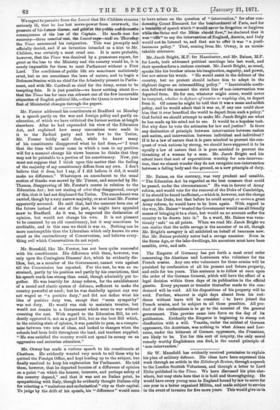Mr. Stansfeld, like Mr. Forster, has not been quite successful
with his constituents. His difference with them, however, was only upon the Contagious Diseases' Act, which he evidently dis- likes, but, as a member of the Government, cannot vote against till the Commission has reported. For the rest, he was so re- strained, partly by his position and partly by his convictions, that his speech reads less strong than usual, though admirably put to- gether. He was heartily for Army reform, for the establishment of a sound and elastic system of defence, sufficient to make the country powerful at need ; but he was decidedly against any war not waged as " a positive duty," and did not define what his idea of positive duty was, except that "mere sympathy" was not duty. He would run risk to maintain treaties, but would not remain in a Government which went to war without counting the cost. With regard to the Education Bill, he evi- dently approved it, not as a good Bill, but as the best Bill which, in the existing state of opinion, it was possible to pass, as a compro- mise between two sets of ideas, and looked to changes when the schools had been built throughout the land, and teachers supplied. "He was satisfied the country would not spend its money on an aggressive and sectarian education."






























 Previous page
Previous page